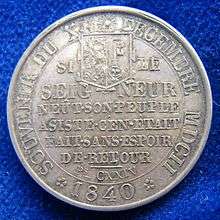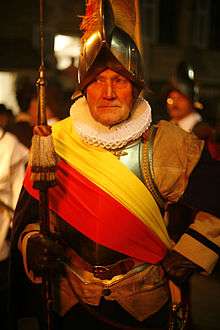L'Escalade
| Fête de l'Escalade | |
|---|---|
 L'Escalade celebrating the defeat of the surprise attack by troops sent by Charles Emmanuel I, Duke of Savoy | |
| Observed by | Geneva, Switzerland |
| 2015 date | 11 December to 13 December |
| 2016 date | 9 December to 11 December |
| Frequency | annual |
L'Escalade, or Fête de l'Escalade (from escalade, the act of scaling defensive walls) is an annual festival held in December in Geneva, Switzerland, celebrating the defeat of the surprise attack by troops sent by Charles Emmanuel I, Duke of Savoy during the night of 11–12 December 1602. The celebrations and other commemorative activities are usually held on 12 December or the closest weekend.
Background
For years, the duke coveted the wealth of the city-state, which was not then a member of the Swiss Confederation. When Charles Emmanuel came to the throne of the House of Savoy in 1580, he longed to make Geneva his capital north of the Alps and crush Protestantism. Pope Clement VIII offered encouragement; in 1602 he appointed as Catholic bishop of Geneva Francis de Sales, an effective preacher who had recently been successful in re-Catholicizing the Chablais district of Savoy on the south side of Lake Geneva.
Attack



On December 11 and December 12 (Old Style) 1602 — the darkest night of the year — the forces of the Duke of Savoy, under the command of the seigneur d'Albigny, and those of Charles Emmanuel's brother-in-law, Philip III of Spain, launched an attack on the city-state of Geneva.[1] The troops marched along the Arve River at night and assembled at Plainpalais, just outside the walls of Geneva, at 2 o'clock in the morning. The original plan was to send in a group of commandos to open the gate door and let the other troops in. The Geneva citizens defeated the men by preventing them from scaling the wall (a climb in French is an escalade). The night guard Isaac Mercier raised the alarm, church bells were rung, and the Genevese were alerted. The populace fought alongside their town militia. The duke's 2000-plus mercenaries were beaten. The Genevese lost 18 men in the fighting; the Savoyards suffered 54 fatalities and the troops had to retreat. Thirteen invaders who had been taken prisoner, including several well-born gentlemen, were summarily hanged the following day as thieves, since they could not be treated as prisoners of war, peace having been repeatedly sworn on the part of Savoy.[2]
According to Genevese legend, Catherine Cheynel, originally from Lyons and the wife of Pierre Royaume, ("Mère Royaume"), a mother of 14 children, seized a large cauldron of hot soup and poured it on the attackers. The Royaume family lived just above the La Monnaie town gate. The heavy cauldron of boiling soup landed on the head of a Savoyard attacker, killing him. The commotion that this caused also helped to rouse the townsfolk to defend the city.
After the defeat, the Duke of Savoy was obliged to accept a lasting peace, sealed by the Treaty of St. Julien of July 12, 1603.
The story of L'Escalade is told in a song called Cé qu'è l'ainô, written in a Franco-Provençal dialect around 1603 by an unknown author. The song has become the "national" anthem of Geneva; while the complete version comprises 68 stanzas, only four of them are usually sung.[3]
It was also celebrated in verse by Samuel Chappuzeau in his "Genève Délivrée", the manuscript of which was presented to Geneva after his death in 1701.
Celebration



Although the armed conflict actually took place after midnight, in the early morning on December 12, celebrations and other commemorative activities are usually held on December 11 or the closest weekend. Celebrations include a large marmite (cauldron) made of chocolate and filled with marzipan vegetables and candies wrapped in the Geneva colours of red and gold. It is customary for the eldest and youngest in the room to smash the marmite, while reciting, "Ainsi périrent les ennemis de la République! " (Thus perished the enemies of the Republic), referring to how Catherine Cheynel, better known as "Mère Royaume," poured boiling hot vegetable soup on soldiers climbing up the walls of the city. Other traditions include mulled wine, a large serving of soup, and children in various types of costumes knocking on people's doors and singing Escalade songs for money. It is also common for children in school to prepare vegetable soup, which is served to parents and families that night. Teenagers tend to throw eggs, shaving cream, and flour at each other as part of the celebration. The high school students parade together by first going to "conquer" each other and end up in the central square of the old town after walking through the "rues basses" to the plaine de Plainpalais and back.
There is also a parade on Friday evening: the names of the eighteen who died—Jacques Billon finally died of his wounds a year later—are called out, one after another. The historical procession on Sunday features more or less 800 people (from old Genevese families) with historical costumes, the remaining fragments of the ladders used by the Savoyards, and horses. This parade - organised since 1926 by the Compagnie de 1602 - attracts every year generally tens of thousand spectators.
Escalade Run
Since 1978 there has been another element to the celebration of the Escalade, with a road running event being held the weekend of or preceding the night of the 11th (depending on whether or not the 11th falls on a weekend).[4] The run traditionally starts in the parc des Bastions and goes through the Old City of Geneva, before finishing near the start again. It is one of the most significant annual events in Geneva.[5] To partake in the Escalade race, people register and pay online or by mail. When registering, people have to specify which race they want to run. There are options for male races and female races for different age groups classified under year of birth and in some cases with which institution (for example with Ecolint at different grade levels). Besides the regular runs, there are three other major races: the Duke's race which is exclusive for adults and it costs 45 CHF, the Walking and Nordic Walking races for the ages of 10+ cost 27 CHF and the Marmite adults and youth races, in which participants wear costumes, which cost 26 CHF and 16 CHF respectively.[6] In recent years, participants in the races started wearing group t-shirts and creative costumes to the run, thus making it a continuation of the parade. After each race the results are announced and the best results of each race get published in the Tribune de Genève.[7]
References
- ↑ Gaspare Lorchano, Mercurius Gallobelgicus, vol. 4 (Cologne, Wilhelm Lutzenkirch, 1603), p. 465f. Available on Google Books
- ↑ Compagnie de 1602.
- ↑ Cé qu'è lainô: National hymn of Geneva Lyrics and French translation
- ↑ http://www.worldcat.org/title/escalade-son-origine-et-ses-consequences/oclc/715050789
- ↑ http://www.swissinfo.ch/eng/multimedia/video/Fete_de_lEscalade.html?cid=28995618&itemId=28995606
- ↑ http://www.escalade.ch/cms/index.php/en/categories-and-schedule
- ↑ http://www.escalade.ch/cms/index.php/en/results
External links
| Wikimedia Commons has media related to L'Escalade. |
- Compagnie de 1602, the group who organises the yearly festival.
- La Course de l'Escalade.
- World History at KMLA: The Savoyard attack on Geneva.
- Fête de l'Escalade: a yearly celebration in Geneva in memory of the night attack by the Savoyards in 1602.